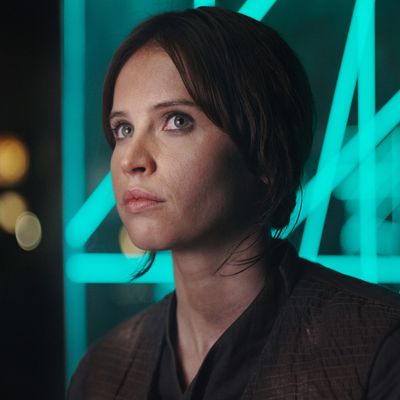
On Wednesday, Disney CEO Bob Iger began a process that will last until December 16: downplaying the expectations for Rogue One: A Star Wars Story.
“We never felt it would do the level that Force Awakens did,” Iger told an audience of investors. While he then went on to say that “the level of interest [in Rogue One] is as high as it was for Force Awakens,” at least according to the reactions that early teasers have received, the message from Disney was clear: They neither need nor demand that Rogue One make Force Awakens money.
How could they? you might think. After all, The Force Awakens is the highest-grossing release in domestic-box-office history, and to expect a new movie, even a new Star Wars movie, to reach those heights would be absurd. But the matter’s more complex than that. For Disney, it makes all the sense in the world to try to lower the bar that’s been set for Rogue One — regardless of how much they think it can make.
Let’s be clear: Unless they’re delusional or hopelessly arrogant, Disney certainly doesn’t think Rogue One will match The Force Awakens at the box office. The latter made $248 million on its opening weekend and $936.7 million over the course of its run, both domestic records, plus a worldwide total of $2.07 billion — an achievement that trails only Avatar and Titanic. Those are numbers that require a special kind of alchemy to create, one that depends on not only the Star Wars name but also a decade gap between installments and a well-received film that managed to embody the qualities that people love about the franchise. Not only was The Force Awakens a Star Wars movie — it was just about the Star Wars-iest movie imaginable, returning Carrie Fisher and Harrison Ford to the roles that made them icons and introducing a handful of new stars, all under the direction of franchise whisperer J.J. Abrams.
By its very nature, Rogue One is not that. First of all, its “A Star Wars Story” subtitle provides a nice little hint that Disney has to draw parallels between this and the first seven films, all of which were called some variation of Star Wars Colon Something Something. Instead of following the main Star Wars thread, it tells the story of a bunch of characters on what you might think of as a side quest, none of whom we’ve seen before; and although its director, Gareth Edwards, got experience working in blockbusters with Godzilla, he has far less of a track record with this kind of film than Abrams, not to mention the specter of “reshoots” hanging over him — regardless of the truth behind that rumor.
None of this means it shouldn’t be huge; in fact, it all means that it should be huge, really huge, and potentially the highest-grossing movie of the year. But thanks to Marvel, Disney has a wealth of experience with putting out what you might think of as the lesser films in a cinematic universe, and one of the most important elements of doing that successfully is managing the narrative that surrounds them. Marvel has established an environment in which its individual franchises all orbit the backbone of Avengers movies, freeing up those other titles to not have to do the same kinds of business to be successful. If Avengers: Age of Ultron makes $1.4 billion worldwide in 2015, then Ant-Man, also released that year, can make $519 million and still be a winner. But Marvel had the luxury of starting small: Even though the first and second Iron Man movies were both huge hits — and The Incredible Hulk wasn’t — they didn’t have the model of The Avengers to live up to. Expectations were established from the start, and the ground was gradually seeded for The Avengers to be enormous.
The opposite of this approach, and one that exists as a cautionary tale for Star Wars, is the DC Extended Universe. DC’s efforts didn’t begin all that differently from Marvel’s: They started with a film centered around a flagship superhero, in this case Superman in Man of Steel. But instead of slowly building toward to a major team-up movie, with audience appetites whetted through a number of smaller franchises, DC went straight from Man of Steel to Batman v. Superman. There are plenty of reasons why DC and Warner Bros. did this: First of all, they were already way behind Marvel; second, it hadn’t been that long since Christopher Nolan’s Batman trilogy, even if they aren’t a part of the DCEU; and third, it’s hard not to grab for the shiny gold ring. The problem is that, in doing so, they set expectations extraordinarily high for themselves. Despite its reputation as a failure, Batman v. Superman made more money than all but four MCU movies, and it’s the 47th-highest-grossing movie of all time worldwide. Sure, it wasn’t a historic hit, but in a vacuum, $873.3 million looks pretty good, particularly for a movie that people straight-up didn’t like. It’s just not good enough for what the studio had billed it as.
Which leads us back to Lucasfilm and Disney. As it stands, the Star Wars franchise looks a little like if Marvel had started off with The Avengers instead of Iron Man, with the challenge of having to deescalate from The Force Awakens while still building on its momentum. To do that, Disney has to make as clear as possible the idea that, even though Rogue One is a Star Wars story, it isn’t the Star Wars story; it’s free to be its own thing. There’s a reason studio projections of a movie’s opening weekend are often lower than independent tracking: It’s always better to overachieve than underachieve. And with The Force Awakens looming in the rearview, the only way Rogue One can avoid underachieving is if it’s judged by an entirely different set of measurements.




